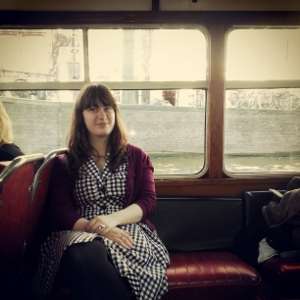Opening the concert season at Leiden’s Stadsgehoorzaal was a beautiful concert of chamber music by two talented young string quartets: the Finzi Quartet and Quatuor Byron. On the program were string quartets by Haydn, Ravel and Shostakovich – an eclectic mix that turned out rather well. The absolute highlight of the evening was Shostakovich’s String Quartet No.8, played incredibly well by the Quatuor Byron.
The evening was opened by the Finzi Quartet, who played Haydn's String Quartet in G from the Erdödy Quartets with enthusiasm and a beautiful, clean, elegant sound. This worked well for the Haydn quartet; a pretty straight-forward and harmonious piece. Much more exciting though, was Ravel’s String Quartet in F major, which was played with more energy and a raw edge. The second movement, Assez vif, allowed the Finzi Quartet to let loose a little, which they did with a visible amount of pleasure. The Ravel piece is interesting in that it is less straight-forward and arguably less melodic than the Haydn and I remember it much more clearly from the evening. Written when Ravel was just 28 years old, the work was not well received, neither by its dedicatee Gabriel Fauré nor by the judges of the Prix de Rome but it is difficult to understand why. It has the exciting rhythms that are typical of Ravel, but there is also a certain clarity and emotional content that make it a piece that leaves a lasting impression.
The Quatuor Byron are a young Swiss string quartet that have recently released a CD with music by Shostakovich, and tonight they played some of these recorded pieces: the famous String Quartet No.8 as well as the shorter Two Pieces for String Quartet (Elegy and Polka). The Two Pieces predate Shostakovich’s string quartets, but they were never published during Shostakovich’s lifetime. He did reuse some of the music, the main melody of Elegy reappears in Lady MacBeth of Mtensk and Polka can be heard in Shostakovich's ballet The Age of Gold. First violinist Wendy Ghysels showed off her immense skill during Elegy, a deeply impressive and bleak work with a haunting melody. Polka was something else completely, it enticed more than a few giggles in the crowd because of its ironically upbeat nature, so radically different from the other works heard tonight. The contrast could not be much greater between the Polka and Shostakovich’s String Quartet No.8.
Shostakovich’s String Quartet No.8 is one of the highlights of 20th Century chamber music. It consists of five movements that all flow into each other and contains many citations from other Shostakovich works, not least of all the First Cello Concerto and his First Symphony. Shostakovich's DSCH motif also has a prominent place; the quartet opens with it and it features in every single movement. Whilst the Finzi Quartet played clean and pitch-perfect, the Quatuor Byron’s style of playing suited String Quartet No.8 exceptionally well; by letting go a little they sounded a bit dirtier which added to the incredible power of the music. The second movement, Allegro molto was particularly impressive, I think I forgot to breathe until it was over – the despair and persecution of the movement were expressed so powerfully. Their standing ovation was much deserved, and I look forward to hearing this quartet perform more of Shostakovich works.


